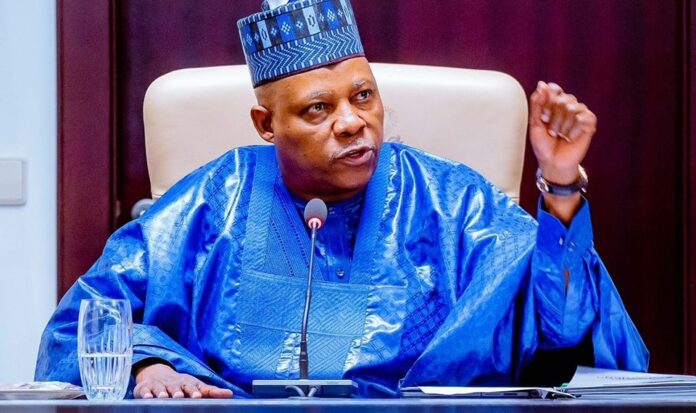Vice President Kashim Shettima has called upon stakeholders from various sectors to transcend narrow-minded sentiments and prioritize quality education for the girl child.
He expressed concern that gender-based obstacles have long hindered the educational opportunities available to girls, stressing that ensuring their education must now take precedence.
Shettima highlighted that this mission requires collaboration among government entities at all levels, traditional leaders, religious authorities, civil society organizations (CSOs), and partners from the donor community.

“We must unite with a common goal: to guarantee that every Nigerian child, irrespective of gender or location, receives a quality education,” Shettima emphasized during his opening remarks at the International Conference on Girl Child Education in Nigeria, held at the Banquet Hall of the Presidential Villa in Abuja.
He asserted that the dignity of the girl child is a reflection of the values of any civilization.
Represented at the conference by Senator Ibrahim Hadejia, Deputy Chief of Staff to the President (Office of the Vice President), Shettima stated, “Any reforms we implement to create a supportive environment for educating girls must originate within our communities.”
“Policy development is a collective effort, and we must involve local leaders, traditional rulers, and religious figures to convey the profound implications of neglecting the education of our future generations.”
“The most significant gift we can provide to the girl child is education. We must strengthen educational programs that empower girls and women with knowledge about their rights and the risks associated with being denied the ability to make informed choices, particularly regarding health.”
Shettima further urged government partners, including the World Bank, African Development Bank, and other international institutions, to contribute to making a lasting impact.
“The dignity of the girl child is fundamental to every civilization, and today we bear the responsibility to do more than merely recognize the challenges we face. We are tasked with shaping the future of this nation, and prioritizing the education of the girl child and other vulnerable children is of utmost importance. We cannot afford to look away from this reflection, as the consequences are severe,” he stated.
In sharing statistics regarding out-of-school children in Nigeria, including findings from the latest Multiple Indicator Cluster Survey (MICS), the VP cautioned that “every child left to roam the streets becomes a future liability for the nation.”
“We must acknowledge that a child who is out of school today poses a threat to their classmates tomorrow. We cannot ignore this reality, and the demand for innovative and effective solutions has never been more urgent,” he concluded.




